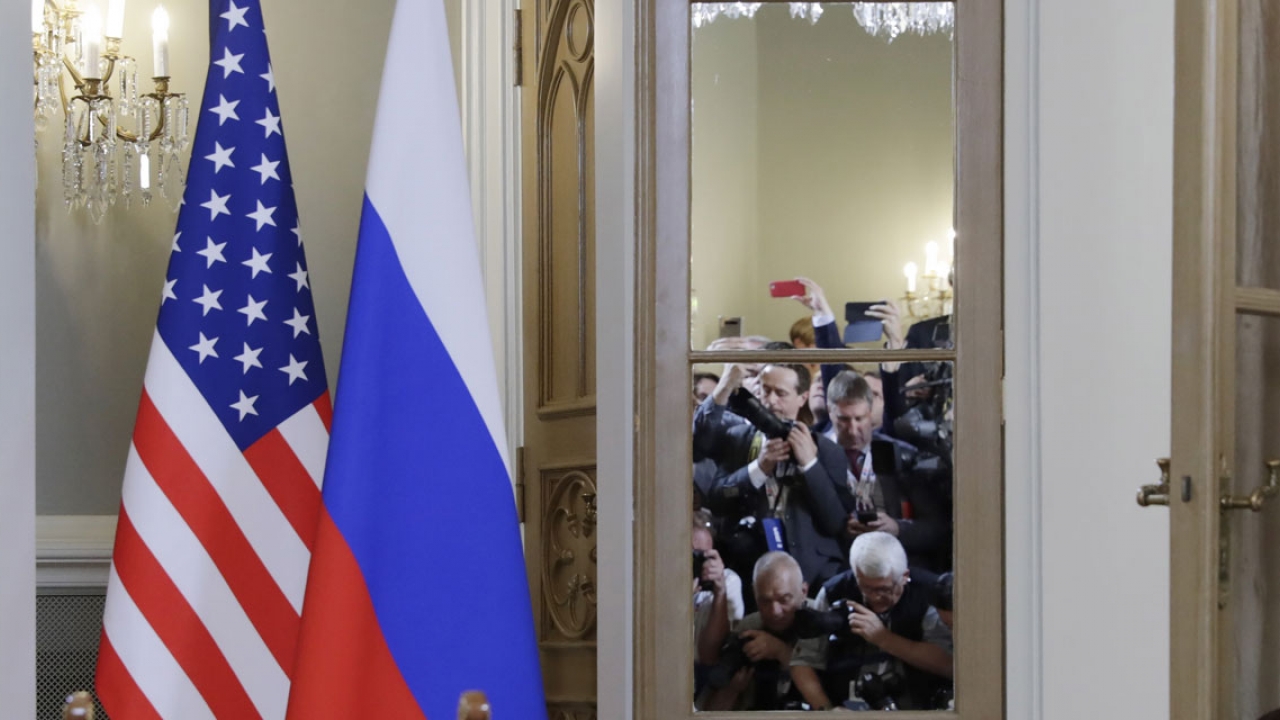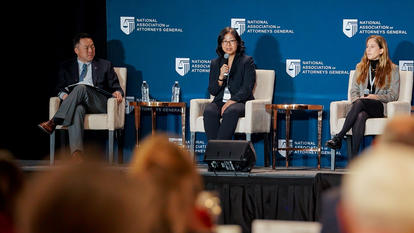After Trump-Putin Summit, Wellesley Professors Discuss What’s Next for U.S.-Russia Relations

On July 16 in Helsinki, President Donald Trump and Russian President Vladimir Putin had their first one-on-one summit, amid questions and concerns from the international community about Russia’s actions in Crimea, Ukraine, and Syria, and its meddling in the 2016 U.S. presidential election.
The Daily Shot sat down with two Wellesley College professors to get their take. Nina Tumarkin, Kathryn Wasserman Davis Professor of Slavic Studies and professor of history, advised President Ronald Reagan ahead of his pivotal summit with Soviet Union leader Mikhail Gorbachev in 1985. Igor Logvinenko, assistant professor of political science, is an expert on the nexus of economic globalization and political development in low- and middle-income countries like Russia and other post-Communist states.
In the wake of the meeting earlier this week, what do you think is next for U.S.-Russia relations?
Igor Logvinenko: I don’t think we’re going to see much change; the status quo is going to remain. The summit didn’t have many tangible gains as far as policy changes or concrete steps forward, for example, because any change to policies such as sanctions will require Congressional approval. Given the increasing distrust of Trump in Congress (especially concerning his dealings with Russia), I believe the sanctions will be here to stay.
What happens in Europe is the interesting piece—there is a lot of volatility in that region right now, from governing coalition troubles in Germany and discord in the British cabinet, and an environment ripe for trade wars and disputes. If Trump was truly trying to benefit Putin, he would continue destabilizing the E.U. There is a powerful business lobby in Europe that is interested in restoring normal trade relationships with Russia. This will be much easier to achieve if there is a real rift within the European Union.
Nina Tumarkin: At this point, I think what needs to happen is for Trump and Putin to be fairly quiet—and I think they both probably will be—with no more one-on-one meetings planned. Trump was reportedly shocked by the backlash of his comments during the press conference, and while Russia has had a short-term gain in the wake of this summit and their recent successful hosting of the World Cup, Putin is facing challenges in his own country, where popular trust in him has plummeted, so a summit that showed him to be so dominant is helpful to him. However, in the wake of the U.S. backlash against Trump’s statements, Congress and the American people are going to be even more hostile to Putin and Russia, which in the long run will be harmful to Russia.
There are some areas, however, in which real progress can be made: agreements and common ground on nuclear disarmament, curtailing Iran’s threat to Israel, and increased bilateral interactions between the two countries outside of the one-on-one, leader-to-leader meetings. Some dialogue is important, because besides climate change, the greatest immediate danger to the world is the possibility of nuclear war. Despite that, I hope these two leaders do not meet “early and often.” We need stronger relationships between our secretary of state and their foreign minister, for example, to build on dialogues, and take some of the attention away from leader summits.
How have Americans’ views of Russians changed over the years, and what are Russians’ views of Americans? What are some similarities and differences between the two countries’ view of politics and their leaders?
Tumarkin: In June I was in Russia for three weeks, conducting research and interacting with several interesting groups of Russians—from a motorcycle club and strong pro-Putin factions, to a paramilitary youth organization whose leaders are retired Russian military officers. I was shocked by the levels of anti-Americanism I observed in these interactions. They blame the U.S. for most of the world’s problems. These people strongly believe that had Hillary Clinton been elected president, she would have waged actual war on Russia. And they believe that we are under state control here in the U.S., that we don’t actually have real freedom. A lot of these ideas are cultivated and promoted by state-run television.
And in the U.S., we have been seeing a personal vilification of Putin on the part of our government (except the president) that has little historical precedent. Previous U.S. leaders did not vilify Boris Yeltsin or Mikhail Gorbachev, and although President Reagan was about as anti-Soviet as you can get, referring to the USSR as the “evil empire,” he never said anything negative about a Soviet leader. But two phenomena, the sports doping scandal and the election meddling and cyber infiltration, have changed some of those views historically held by Americans about Russians.
Logvinenko: I think when it comes to public opinion, there is still a separation between how people in Russia view the government and the American people. A plurality of Russians see the United States as the number-one enemy of Russia. But there is an overlap in worldview between “Trumplandia” in the U.S. and what you experience in much of Russia outside of the major cities. When I talk to my students about it, I ask them to imagine only having the option of watching Fox News for 18 years. Many Russians who are supportive of Putin also tend to share the view that the world is against their country, that they have to make Russia great again, and that they are battling against unfair economic deals they’ve been dealt—it’s very similar to worldviews Trump’s base holds. We see anti-immigration, racist views, and strong grievances in both countries, and Trump responds to his base, and Putin to his.
Did the reaction to the Trump-Putin press conference surprise you? Why or why not?
Logvinenko: I was surprised by the apocalyptic reaction in the U.S. media after the press conference. After all, Trump previously asked a foreign power to hack the emails of his opponents during a campaign event. That was certainly less than patriotic. With Trump, there is a new bombshell every couple of days, so the level of outrage was rather surprising.
Tumarkin: The wrath that was directed at Trump after he sided with Putin over his own country’s intelligence findings was certainly understandable. To me, the U.S. president’s statements were not surprising because they reflected Trump’s pathology—he is obsessed with making sure everyone knows he was elected fairly. And this creates blind spots for him. In my opinion, the most appalling interchange was when Trump was asked what, if anything, he would hold Russia accountable for in the worsening of the U.S.-Russia relationship. Trump was incapable of naming a single thing—from Crimea, support of Assad, or the murder of Russian journalists, to name a few. He wouldn’t name a single one. That’s pretty scary.



